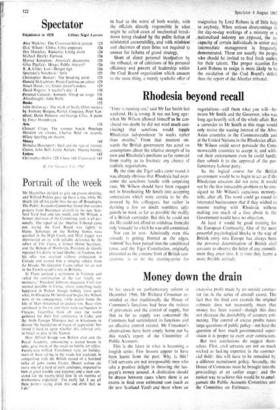Man has always paid a terrible price for coal and
this weak the nation is re-living one of the Most costly episodes in the history of mining. By the time this issue of the SPEC- TATOR reaches readers, the report of the Aber- fan tribunal will have judicially allotted blame for the disaster in which 144 lives were lost in the space of a few minutes.
Unlike the event which gave rise to its task, however, the central finding of the tribunal can hardly come as a surprise. It could be foreseen long before publication and was, in- deed, indicated during the public sittings of the inquiry by counsel for the National Coal Board, using these words : 'I wish to say in unequivocal terms that blame for the disaster must rest upon the National Coal Board.' And again, in the course of the same closing speech by the board's counsel : 'It need not have happened and should not have hap- pened if proper site investigations had been carried out beforehand. The failure to have any site investigations beforehand must be attributed to lack of instructions from the Coal Board.'
Thereafter the direction in which the tribunal's report would have to point became apparent. And, indeed, what had emerged from the tribunal's seventy-six sessions was essentially an account of omissions, on a tragic scale, by the public body charged with ' the conduct of coal mining, and by a num- ber of the men whom it employed. It was abundantly plain that the danger from rub- bish tips had been underrated : yet the disastrous slide of the Aberfan tip in 1966 was not unique except in the toll of life which it exacted, and movement of tips was a familiar phenomenon. At Aberfan local people and organisations had repeatedly ex- pressed their concern. None of this had stirred the appropriate people within the Coal Board organisation to take action. The impression given by the board's own wit- nesses was of a patchy and uncoordinated approach to the whole question, with, in the admission of the NCB'S director-general of production, a complete absence of national policy or system with regard to tip safety.
In the aftermath of the report, when its de- tails have been digested, action will be called for in various directions. Parliament has already been assured by the Minister of Power that all colliery tips belonging to the National Coal Board have been critically examined since Aberfan and remedial measures taken where necessary. But of . course precautions on a long-term basis will be required, in all probability involving fresh legislation. (One of the most surprising ,dis- closures made during the tribunal's public sessions was that virtually no legislation at present prescribes proper standards of tip safety.) There will have to be a rigorous re- examination of Coal Board procedures in the light of observations made by the report. In the shadow of a national ,disaster such as happened at Aberfan, the question of tip safety must be seen as a national problem of the utmost urgency.
And then, even before the report was pub- lished the question was being publicly put: Will Lord Robens resign? The question of how much personal responsibility the chair- man of the Coal Board will feel required to accept, in addition to placing a man with a meritorious record of public service in a har- rowing situation, also raises more general issues. The traditional political, conven- tion is that ministers are responsible for the failures of their departments; and since nationalised industries are not directly answerable through a minister to Parliament any more than arc businesses in the private sector, it logically follows that their chair- men are responsible in the same sense that the minister is for his department.
Since Cliche( Down the convention has been subtly changed. It now seems to require that the minister concerned should offer his resignation, which is rejected; by this act he is held to have shouldered responsibility for his officials and wiped the slate clean. By extension, this kind of expiation could be applied to Aberfan by an offer of resigna- tion from Lord Robens.
Yet curiously there has at the same time come to be general acceptance of the propo- sition that ministers, and chairmen of nationalised industries, cannot be blamed for failures of overall strategy, for which they logically should be held responsible. For example, in the 1950s the Atomic Energy Authority was far too sanguine about the speed with which atomic power could be- come commercially competitive, and as a result the whole national energy policy was thrown into disarray. More recently, Mr Callaghan has hardly made one single major economic forecast without being fairly quickly proVed resoundingly wrong. to lead to the worst of both worlds, with the officials directly responsible in what might be called cases of mechanical break- down being cloaked by the polite fiction,df ministerial answerability, 'and with ministate and chairmen of state firms not required to answer for failures of grand strategy.
Short of direct personal inculpation by the tribunal, or of criticisms of his personal efficiency and powers of leadership within the Coal Board organisation which amount to the same thing, a merely symbolic offer of resignation by Lord Robens is of little help to anybody. When serious shortcomings in the day-to-day workings of a ministry or a nationalised industry are:eltosed, the in- capacity of certain individuals in senior and intermediate management is frequently demonstrated. These are usually the people who should be invited to find fresh pptlets for their talents. The proper Occasion for Lord Robens to resign is more likely to be the escalation of the Coal Board's deficit than the report of the Aberfan tribunal.































 Previous page
Previous page